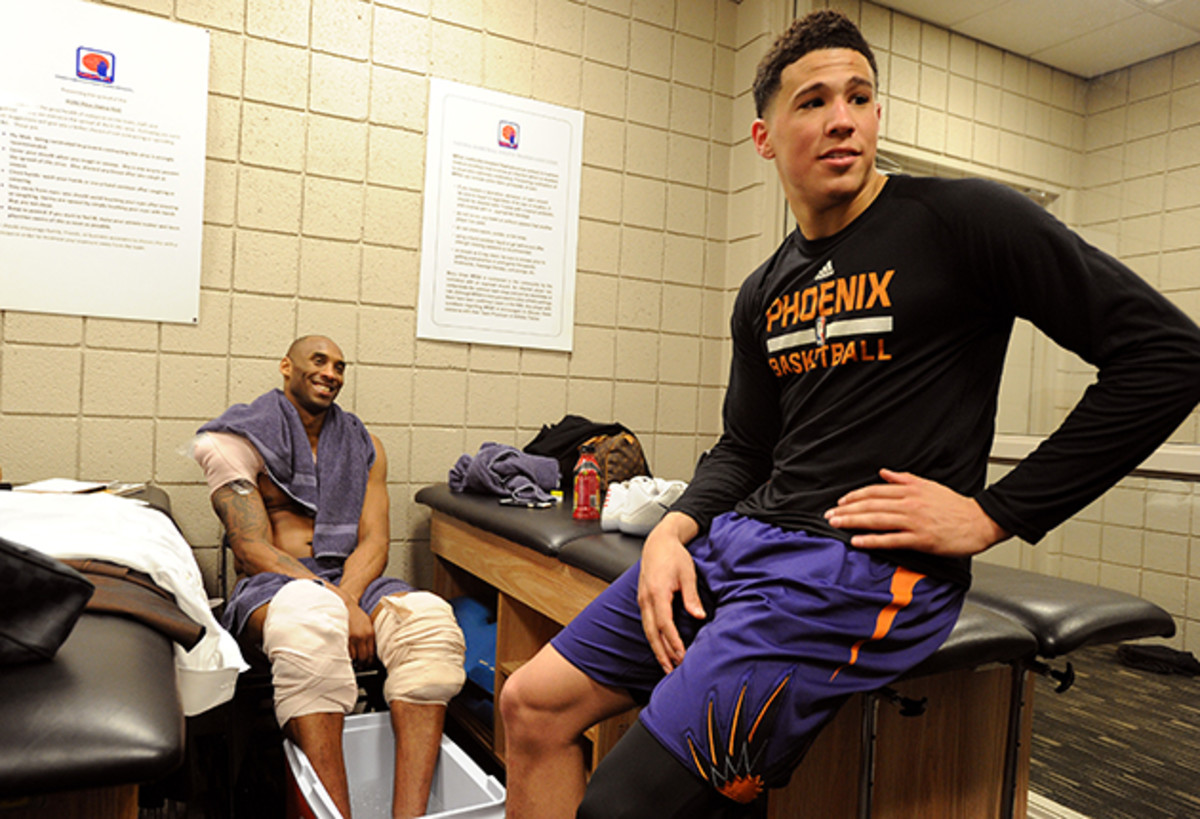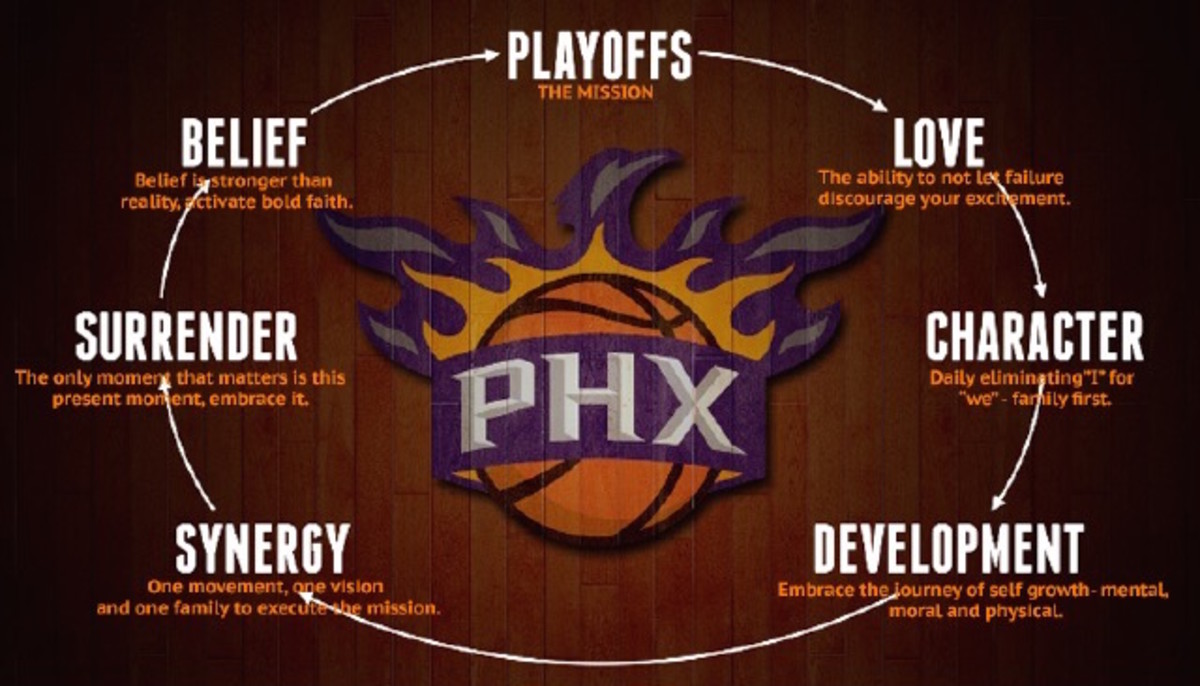Sun shining: Phoenix shaping Devin Booker for stardom

Your teams. Your favorite writers. Wherever you want them. Personalize SI with our new App. Install on iOS or Android.
The real marvel of Devin Booker's breakout rookie season was his exposure to the league's harsher elements. A disgruntled teammate went on what amounted to an active strike. Veteran assistant coaches were dismissed in-season. Both of the Suns' lead guards and its starting center missed significant time with injury. His head coach was fired and then replaced, officially, by an assistant who began the season on the back row of the bench. Booker is all of 19 years old and yet strangely seasoned, subject to franchise turmoil that never seemed to stall his progress.
"I feel like I've seen it all," Booker said. "You don't realize all that when you're just a fan of the NBA. You learn the business of the game once you get in there."
Therein lies the silver lining—a "diamond in the rough," per Suns head coach Earl Watson—of an eventful year in Phoenix, fraught with bad breaks, missteps, and unintended consequences. The escalating weirdness eventually let Booker loose as a primary ball handler. It suited him in ways completely uncharacteristic of players at his age and experience level, much less his entrenched role. The Booker pro scouts knew the rookie from Kentucky was a shooter by trade. The Booker the league saw blossom over the back half of the season was a wholly more complicated cover with a mature sense of timing and ball control.
"The kid cannot be rattled, mentally," Watson said. "His mental toughness is beyond his years."
• Booker among NBA Summer League stars | Booker forms unlikely bond
Phoenix is pushing Booker to do more even as circumstances might call for him to do less. Part of the reason he made a three-game cameo at the Las Vegas Summer League prior to attending this week's camp with USA Basketball was as an exercise in leadership; Watson and the Suns have seen enough from Booker that they've urged him to take a more deliberate role at the forefront of the team. That kind of effort would feel forced if not for the strength of Booker's play. With performance comes credibility.
"As a young player, he comes into the league and focuses on everything that you have to do to get better," Watson said. "We need him to enhance everyone else as well."
The calm in the way Booker plays lends itself to direction. NBA veterans are predisposed to roll their eyes at a young teammate who tells them where to be on the floor or how to go about their business. Booker, though, exercised surprising patience for a first-year guard pulled into spot duty as Phoenix's point guard. Where other rookies would move far too quickly in an effort to create opportunity, Booker waited out gaps in the coverage to make the most of his moves. "You realize that you can take your time with things," Booker said. "But once you make your move, it's fast."
It might actually help Booker's game that he isn't an exceptional athlete by NBA standards. Booker is quick, but not so quick that he looks to blow by an opponent without thinking through where he's going. He's agile, but not so agile that he could fool himself into thinking he could worry about the second layer of the defense when he comes to it. "He has to see [the initial play] before it happens, understand the next play before it happens, and realize the domino effect or the fluid puzzle of this game of basketball," Watson said. This isn't just the path for Booker to improve—it's the key to every drive he makes.

Further developing that sense takes time, whether it's in the disarray of summer league play, the crowded talent pool of USA Basketball camp, or the impending regular season. Phoenix has seen enough to know full well what kind of responsibility Booker can handle. It's up to Watson and his staff to ensure that enough of those reps are available to him, even amid the full-time return of Eric Bledsoe and Brandon Knight. That balancing act will require that the Suns, who often contorted their rotation last season to cover for the absence of some player or another, buy in a deeper level.
"We don't want to hold anything back," Watson said. "The only thing we sacrifice are our points per game, our minutes per game, and getting the most attention. We share it. We're a true family. We believe in it. We instill it. And the guys, the culture, and the energy, I think it's visible. It's transparent."
Watson is an acolyte of Spurs general manager R.C. Buford, who conveyed to him the importance of building just such an ecosystem. He's endeavored to do so by making a Spursian concept his own. Internally, San Antonio has referred to the process of its on-court play as the "Krebs cycle"—a co-option of terminology for the chemical process that allows the human body to create energy. To the Spurs, that cycle refers to how the stages of play connect with one another; ball movement leads to a shot attempt which leads to transition defense which leads to half-court defense which leads to defensive rebounding which leads to transition offense and, finally, ball movement. The Suns' version of the Krebs cycle is a broader vision to shape the team's collective mindset:

(Photo credit: Earl Watson/Phoenix Suns)
The current goal—which Watson says will rotate with time—is to make the playoffs. Every stage around the cycle facilitates that pursuit in some way, each tied to the concurrent idea of promoting growth beyond basketball. Watson, a UCLA product, has built a cyclical outline unsurprisingly filled with Woodenisms.
"It's gonna be a constant journey, constantly getting better," Watson said. "But we never get discouraged. That's a part of the 'LOVE' in the Krebs cycle—never let fear discourage our excitement. Continue to build it. We dream big, but we surrender to where we are now. We have to work."
The concepts themselves are simple and applicable, but only work if the players themselves take the framework seriously. CHARACTER ("family first") and SYNERGY ("one movement, one vision") could help bring Phoenix's offense to balance between its trio of shot creators, or might be deemed quaint concepts by working professionals. Watson's ability to connect with his players—a strength according to many who work with him—is at the core of the thing. This could be a basketball culture in its infancy.
• Suns legend Nash helped deliver Durant to the Warriors
It bodes well for Watson's cycle that players like Booker have already adopted some of his particular language. There is an evident synergy in their messaging as far as what is needed from Booker in the season to come, whether in terms of leadership, efficiency (which dipped with Booker's swollen role), or defensive awareness. The latter is especially important for a young player who too often got lost in the shuffle of a full-speed NBA scheme.
"There are a bunch of [defensive] rotations I never knew in college," Booker said. "That comes with the defensive three-seconds. You can't be in the paint, but you still have to rotate. There's so much more to it—much more detail in the NBA—but I'm catching on pretty quick."
"The details," Watson said, "are what we try to capture." The defense of every pick-and-roll or pin-down at the NBA level depends on them. Some of the specifics elude Booker for now, but not for lack of trying or engagement. It simply takes time for younger players to learn when and how to react within a team concept. When Booker works on his skills, his communication style, his approach, or his body ("You think you're in shape until you have to chase J.J. Redick off baseline screens," Booker said), he's working to improve himself as a professional.
Every rookie is entitled that window of realization. The NBA is a brave new world that demands significant adjustment, even for players who acclimated themselves as well as Booker. Clearly he can make plays, shoot, and generate offense already. Next comes the arduous work of building something.
